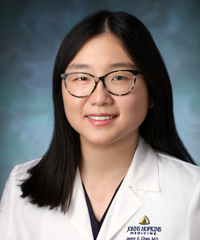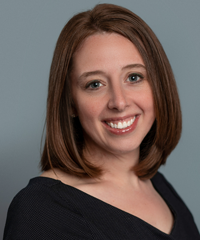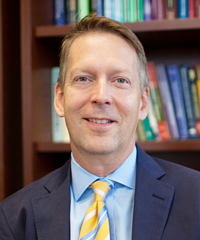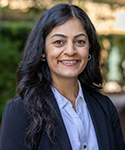Research Projects
ABMS Research and Education Foundation
The American Board of Medical Specialties Research and Education Foundation (ABMS REF) grant program funds innovative research that explores the impact of board certification and aims to enhance health care quality and professional standards. Meet the grant recipients and learn about their research projects.
2025–2027 Grant Cohort
In 2024, the ABMS REF sought proposals for original research that would provide insight and inform improvements in the structures, processes, and outcomes of medical specialty certification. Meet the ABMS REF 2025-2027 grant cohort and learn about their research.

Jenny X. Chen, MD, EdM
Assistant Professor
Johns Hopkins School of Medicine
Project: Developing and Validating a Professionalism Instrument for Otolaryngology-Head and Neck Surgery

Alison N. Huffstetler, MD
Assistant Professor
Virginia Commonwealth University
Project: Morbidity and Mortality for Birthing Individuals: Understanding the Impact of Family Medicine Perinatal and Obstetric Fellowships on Perinatal Care in the US (MUM)

Brenessa M. Lindeman, MD, MEHP
Assistant Professor; Assistant Dean for Graduate Medical Education
University of Alabama at Birmingham
Project: Entrustable Professional Activities to Inform Competency-Based Board Admissibility in Surgery

Yoon Soo Park, PhD
Ilene Harris Professor; Department Head of Medical Education
University of Illinois College of Medicine
Project: Enhancing Residency-Fellowship Transition: Exploring the Role of Board Certification and Milestones Competency Ratings as Feedback for Learner Preparedness
2024–2026 Grant Cohort
In 2023, the ABMS REF invited grant proposals under two themes: General Certification (funded by the ABMS REF) and Diagnostic Excellence Through Certification (primarily funded by the Gordon and Betty Moore Foundation).
General Certification
The General Certification theme supported investigator-driven proposals that spanned the full range of the ABMS mission and were not limited to any one area or topic. Meet the ABMS REF grant winners in the General Certification theme and learn about their research.

Arch Mainous III, PhD
Professor
University of Florida
Project: The Impact of Continuing Certification on Quality of Patient Care
Summary: Does participation in continuing certification activities lead to improved quality of care by participating family physicians?

Brigitte Smith, MD, MHPE
Associate Professor
University of Wisconsin
Project: A Mixed-Methods Investigation of the Relative Merits of Different Oral Certifying Examination Formats
Summary: This will be a mixed-methods sequential explanatory study using semi-structured interviews to investigate the perceptions of recent diplomates, and ABPS, ABOS, and VSB directors and psychometricians, regarding the relative merits of different Oral Certifying Examination formats, paying particular attention to the impact of the certification format on early-career clinical behaviors.

Daniel West, MD
Senior Director of Medical Education and Professor
Penn School of Medicine
Children’s Hospital of Philadelphia
Project: A Multi-Site Implementation and Effectiveness Study of a Protocol to Support Equitable Competency-Based Advancement Decisions and Resident-Driven Learning
Summary: A consortium of five pediatric residency programs will conduct a staggered, two-wave implementation of an EPA-based assessment program across their sites, using implementation science methods to test whether an implementation bundle will improve implementation fidelity as well as resident-driven self-assessment and learning activities.

Fasika Woreta, MD, MPH
Associate Professor of Ophthalmology
Wilmer Eye Institute
Johns Hopkins University School of Medicine
Project: Gender, Racial and Ethnic Diversity in Oral Board Examiners of Surgical Specialties
Summary: This research project aims to evaluate the diversity of examiners and examinees in surgical specialties, analyzing trends over a decade and assessing the impact of examiner-examinee gender concordance on pass rates.
Diagnostic Excellence Through Certification
Offered during the 2024–2026 grant cycle, the Diagnostic Excellence Through Certification theme was principally funded by the Gordon and Betty Moore Foundation. Grant applications aligned with the Gordon and Betty Moore Foundation’s Diagnostic Excellence Initiative, which sought to strengthen accountability for diagnostic excellence, support growth and capacity of the field, and assess the potential for new technologies to improve diagnostic performance. Meet the ABMS REF grant winners in the Diagnostic Excellence Through Certification theme and learn about their research.

Laura Burke, MD
Assistant Professor of Emergency Medicine
Beth Israel Deaconess Medical Center; Harvard Medical School
Project: Association Between Emergency Medicine Board Certification and Diagnostic Error in Emergency Care: A National Analysis
Summary: The investigators will use the Medicare Claims data to examine the association between certification by the American Board of Emergency Medicine and the risk of diagnostic error for beneficiaries visiting the Emergency Department.

Kiran Malhotra, MD
Clinical Informatics Fellow
New York University Langone Health
Project: Automated Mapping of Visit Diagnoses to Specialty Board Clinical Domains for Enhanced Assessment, Certification, and Precision Education
Summary: The investigators will develop an automated precision medical education tool using electronic health record (EHR) data to describe an individual resident’s diagnostic exposures and evaluate their impact on key patient outcomes.

Ting Wang, PhD
Senior Psychometrician
American Board of Family Medicine
Project: Enhancing Diagnostic Accuracy and Calibration via Automated Clone Item Generation and Personalized Feedback in Longitudinal Assessment
Summary: This study aims to harness artificial intelligence to support “learning through testing” in medical certification processes by evaluating AI-generated cloned test questions and assessing the impact of tailored feedback from large language models on improvements in accuracy and confidence of learner diagnosis.
